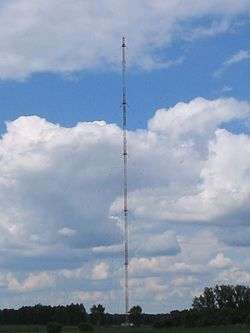Sender Zehlendorf
Sender Zehlendorf is a radio transmission facility which has been in service since 1936, when a short wave transmitter was built in Zehlendorf (a village near Oranienburg) as part of the establishment of permanent radio services. This Zehlendorf site, which until the end of World War II was referred to as the Rehmate Radio Transmission Centre (German:Funksendestelle Rehmate), had 26 different antennas.

History
In 1945, most of the Rehmate Radio Transmission Centre was dismantled by the Soviet occupying forces as reparation, who left only three wooden radio masts. These wooden masts supplied the building material for a 100-metre-tall transmission tower built at Golm in 1948, which was used until 1979.
In 1952 it was decided to build at the location of the former radio transmission center Rehmate the central long wave transmitter of the GDR. For this between 1956 and 1958 a triangle plane aerial, which was hung up on three 150 metres high guyed masts of lattice steel, which were insulated against ground was built. A second transmitting antenna, which should become the main antenna, was built between 1960 and 1962. It consisted of a 351-metre-high (1,152 ft), lattice steel framework mast, at which a conical cage aerial was mounted, making it the tallest structure in Europe between 1962 and 1964. With this antenna a transmitting power of 750 kilowatts in the long-wave rae on a frequency, which was reduced in course of the time gradually for the reduction by interference from 185 kHz to 177 kHz, was possible. The maximum transmitting power, which is possible over the triangle plane aerial, is 500 kilowatts.
On 18 May 1978 the main mast collapsed after a collision with a Russian airplane of the type Mig-21. After the cause of the collapse was certain, the Soviet Union promised to supply a new mast and to rebuild this. In order not to stop the progress of the construction work by the stricter German safety regulations, for the duration of the construction work the area in the radius of 300 metres was explained as Soviet exclave. In August 1979 the new mast with a height of 359.7 metres was finished.
In 1990 the plant was taken over by the Deutsche Telekom AG. At first it was planned to shut down the facility: so the cage aerial at the 359.7-metre-high (1,180 ft) main mast was dismantled and the transmitting power of the long wave transmitter was reduced occasionally to 100 kilowatts. In the second half of the 1990s a reorientation occurred. The long wave transmitter was modernized and the main antenna tower received a new cage aerial. Also the transmitting power of the long wave transmitter was increased again to 500 kW. In the year 2000 a 120-metre-high (390 ft), guyed, grounded mast of lattice steel carrying a cage aerial for medium wave was built. This took over the function of the former Transmitter Berlin-Koepenick and served apart from the spreading of the program of MEGARADIO also for transmitting of programs of the Voice of Russia, partly in the Simulcast mode. The long wave transmitter changed over on 29 August 2005 as first German large transmitter to Digital Radio Mondiale. The long wave transmitter ceased operation on December 31, 2014 as part of the general shutdown in Germany of AM radio services to the public.[1] The mast continues to support VHF radio antennas providing FM broadcast services.
See also
References
- "Pressemitteilung 28.11.2014". Deutschlandradio. Retrieved 28 October 2016.
External links
| Wikimedia Commons has media related to Sender Zehlendorf. |
- Old Zehlendorf Long-Wave Transmitter (1962) at Structurae
- Zehlendorf Long Wave Transmitter (1979) at Structurae
- Zehlendorf Reserve Long-Wave Transmission Masts (1959) at Structurae
- Zehlendorf Medium-Wave Transmitter (2000) at Structurae
- http://www.skyscraperpage.com/diagrams/?b45305
- http://www.skyscraperpage.com/diagrams/?b45648
- http://www.skyscraperpage.com/diagrams/?b45649
- http://www.skyscraperpage.com/cities/?buildingID=55087